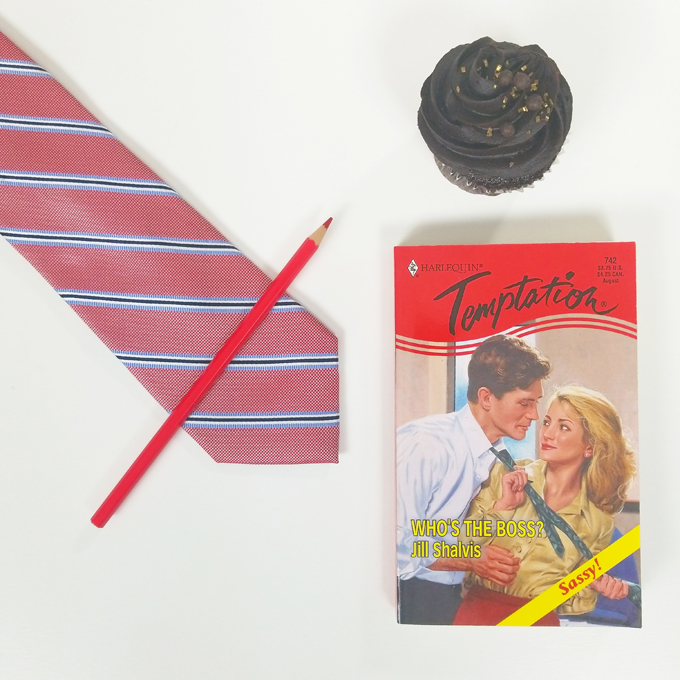What can I say? I have a history of deliberately choosing old category romances with punctuation marks in the title because they amuse the heck out of me. So for this month’s TBR Challenge, I picked up Who’s The Boss?, a 1999 Harlequin Temptation by Jill Shalvis. I found it in a thrift store in New Orleans when I was on vacation with my husband and waited four years to read it. I know it was that long because we were there for the Katrina anniversary and that was in 2015. Honestly? I wasn’t missing much.
Who’s The Boss? is the story of poor little rich girl Caitlin Taylor whose rich daddy died and left her nothing but the promise of a job with his former mentee, Joe Brownley. I really like poor little rich girl plot lines, which fits rather nicely with this month’s TBR Challenge theme of favorite tropes. However, this one ended up being more office romance, which is among my least favorite tropes. Ah well.
So here’s the good stuff. Caitlin is a buxom Barbie blonde who also turns out to have a brain. She reminded me a little of Tara Jean Sweet from Molly O’Keefe’s Can’t Buy Me Love in that way. People constantly underestimate her and she is ready to (sweetly) make them pay for it. The office romance plot was actually also handled as well as could be for what, in my opinion, is nearly always a coercive relationship structure when one party is subordinate to another. The thing is, Joe had promised Caitlin’s dad that he would take care of her so he felt he had a moral obligation to not fire her. And before the couple gets together in any meaningful way, we are made to understand that Caitlin has talents that a secondary character recognizes thoroughly enough to offer her an alternate position should she ever get bored where she is with Joe. So my normal pet peeves about this trope were allayed somewhat.
That said, this book is 20 years old this year. And along with that come some things that diminished its allure for me. First, the constant fat-shaming. Caitlin has a lot of negativity surrounding her curvy shape and others also make free with the comments. Also, she is objectified within her workplace near-constantly by both the hero and his three other male employees. What’s even weirder is that the text makes out like Caitlin thinks their reactions are preferable to the reactions she normally gets. I basically spent the entire book screaming in my head,”YOU LIVE IN CALIFORNIA! YOU DO NOT HAVE TO PUT UP WITH THAT NONSENSE!” Plus the hero struck me as mostly a placeholder. He’s tall, dark, handsome, intelligent, on the cusp of copious wealth; basically your average orphaned romance hero. I didn’t feel anything for him at all and he experienced very little growth beyond grumpy to slightly less grumpy.
Finally, the romance. I mean, it was fine I guess. It develops rationally, along a very familiar pathway. And this is the crux of the problem I’ve had with every Jill Shalvis book I’ve read. Who’s The Boss? was really, really safe. Absolutely nothing unexpected occurred in it at all. I think the only other one I finished also had a woman with daddy issues, come to think of it. I also didn’t care for the pacing. The relationship was quite heavily weighted toward the end of the novel. I have not read widely in this imprint so perhaps that was usual, but it made the ending feel very rushed to me.
Sometimes when I read an early category romance by an author who has since become extremely famous (Nora Roberts, Jayne Castle/Jayne Ann Krentz, Amanda Carpenter/Thea Harrison), I can see glimmers of the writer they will become. Sometimes more than glimmers. In this Jill Shalvis book, I saw none of what readers who love her see. Maybe that’s because I don’t love her now? In any case, Who’s The Boss? did not stand the test of time for me. While I would agree with the cover that the heroine is indeed SASSY! my love for this book doesn’t go much further than that cover.
Better luck next month!



March 23, 2019 at 5:46 pm
Sorry this one didn’t work for you. I love picking up the older romances to see if they stand the test of time. I’m mostly attracted to old Gothics, but I do enjoy some of Leigh Michaels’ Harlequin Romances. But you’re probably right about not finding anything that resembles their style if you’re not fond of the current titles. I like to do that too – to see if I see something that predicts what/how they’ll write in the future.